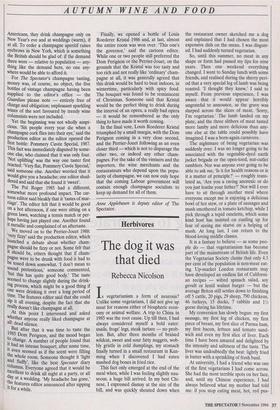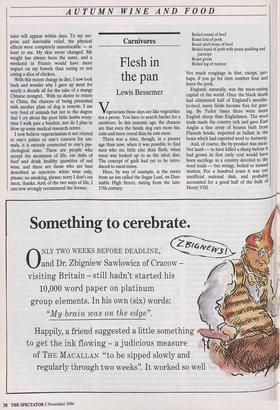Herbivores
The dog it was that died
Rebecca Nicolson
Is vegetarianism a form of neurosis? Unlike some vegetarians, I did not give up meat for reasons either of biospheric econ- omy or animal welfare. A trip to China in 1985 was the root cause. Up till then, I had always considered myself a bold eater: snails, frogs' legs, steak tartare — no prob- lem. But, after three months of braised wildcat, sweet and sour fatty nuggets, wob- bly gristle in cold dumplings, my stomach finally turned in a small restaurant in Kun- ming when I discovered I had eaten mashed dog bones in fried rice.
This fact only emerged at the end of the meal when, while I was feeling slightly nau- seous, a huge bill arrived. In my best Chi- nese, I expressed dismay at the size of the bill, and was quickly shouted down when the restaurant owner sketched me a dog and explained that I had chosen the most expensive dish on the menu. I was disgust- ed. I had suddenly turned vegetarian.
So, until this summer, no meat in any shape or form had passed my lips for nine years. Then one weekend everything changed. I went to Sunday lunch with some friends, and realised during the sherry peri- od that a very special leg of lamb was being roasted. 'I thought they knew,' I said to myself. From previous experience, I was aware that it would appear horribly ungrateful to announce, as the gravy was slurped across the slices of meat, 'Sorry, I'm vegetarian.' The lamb landed on my plate, and the three slithers of meat tasted more lamby and more delicious than any- one else at the table could possibly have imagined. I was a born-again carnivore.
The nightmare of being vegetarian was suddenly over. I was no longer going to be associated with the vegetable-dyed earth jacket brigade or the open-toed, nut-cutlet ramblers. Nor was anyone ever going to be able to ask me, 'Is it for health reasons or is it a matter of principle?' — roughly trans- lated as, 'Are you a raving anorexic or do you just loathe your father?' Nor will I ever have to sit through another meal where everyone except me is enjoying a delicious bowl of hot stew, or a plate of sausages and mash smothered in tomato ketchup, while I pick through a tepid omelette, which some kind host has insisted on rustling up for fear of seeing me starve on a helping of mash. At long last, I can return to the blood-loving middle classes.
It is a fantasy to believe — as some peo- ple do — that vegetarianism has become part of the mainstream of British life. Even the Vegetarian Society claims that only 4.3 per cent of the population is non-meat eat- ing. Up-market London restaurants may have developed an endless list of Californi- an recipes — wilted spinach salad, soy gevult or lentil walnut burger — but the average Briton still settles down to finishing off 5 cattle, 20 pigs, 29 sheep, 790 chickens, 46 turkeys, 15 ducks, 7 rabbits and 1'/2 geese during his lifetime.
My conversion has slowly begun: my first sausage, my first leg of chicken, my first piece of breast, my first slice of Parma ham, my first bacon, lettuce and tomato sand- wich and even my first slice of liver. Each time I have been amazed and delighted by the intensity and saltiness of the taste. The liver was undoubtedly the best: lightly fried in butter with a sprinkling of fresh basil.
At university, I had a friend who was one of the first vegetarians I had come across. She had the most terrible spots on her face, and, until my Chinese experience, I had always believed what my mother had told me: if you stop eating meat, hot, red pus-
AUTUMN WINE AND FOOD
tules will appear within days. To my sur- prise and inevitable relief, the physical effects were completely unnoticeable — at least to me. My skin never changed. My weight has always been the same, and a weekend in France would have more impact on my bowels than eating or not eating a slice of chicken.
With this recent change in diet, I now look back and wonder why I gave up meat for nearly a decade all for the sake of a mangy Chinese mongrel. With no desire to return to China, the chances of being presented with another plate of dog is remote. I am very fond of animals but not to the degree that I cry about the poor little lambs every- time I walk past a butcher, nor do I plan to blow up some medical research centre.
I now believe vegetarianism is not related to one's palate or one's concern for ani- mals, it is entirely connected to one's psy- chological state. There are people who accept the meatiness of life, eat slabs of beef and drink healthy quantites of red wine, and there are those who are best described as rejectors: white wine only, please; no smoking, please; sorry I don't eat meat, thanks. And, of the two ways of life, I can now strongly recommend the former.











































































 Previous page
Previous page